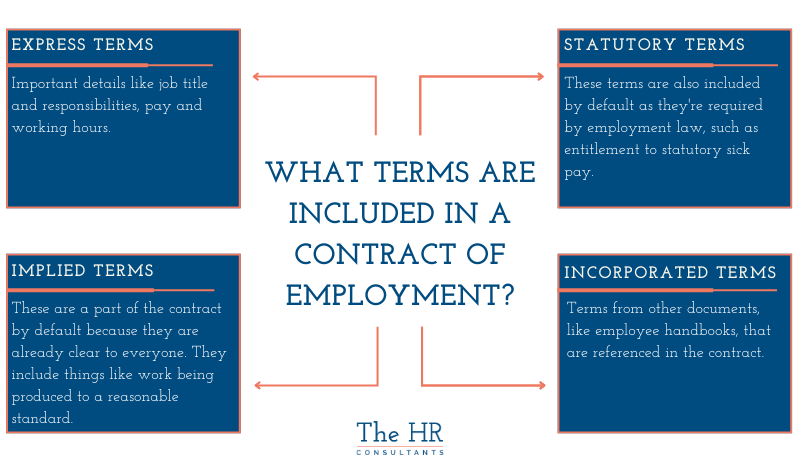At The HR Consultants, we specialise in making complex HR matters simple, and one of the most fundamental concepts we guide businesses through is the contract of employment. Far more than just a legal document, it serves as the foundation of a healthy, transparent, and mutually beneficial working relationship.
[addCTA blink=""/services/employment-law-services/"" title=""Need help drafting or reviewing your employment contracts?""]
What is a Contract of Employment?
A contract of employment is a legal agreement between an employer and an employee that sets out the terms of the employment relationship. It explains the rights, responsibilities, and expectations for both sides.
Many people think of a contract of employment as a document, but a contract of employment begins the moment an employee accepts a job offer, even if it's not written down - this would be considered a verbal agreement.
It’s important to know that a contract of employment is not the same as a written statement of employment particulars. Under the Employment Rights Act 1996, employees and workers hired after 6 April 2020 must receive a written statement including key details about the job, like pay, working hours, and holiday entitlement. This can be included in the contract of employment or provided separately.
Related: What Is Employment Law?

Why are Employment Contracts Important?
If a written statement of employment is enough to meet legal requirements, why go the extra mile to put the full contract in writing?
Here's why it's worth having a written employment contract.
1. They Help Avoid Disputes
Disputes can happen even in the best workplaces but having a written contract makes resolving them much easier. If there’s ever confusion about pay, responsibilities, or anything else, the contract provides a clear reference point.
2. They Protect Confidentiality and Your Business
For employers, written contracts aren’t just about outlining pay and hours—they’re also about protecting what matters most. Confidentiality clauses, non-compete agreements, and similar terms aren't included in a written statement of employment particulars, but can be put into an employment contract to help safeguard sensitive company information.
3. They Show Your Professionalism
Providing a written contract shows you’re professional and serious about your working relationships. Employees feel valued when their terms are clearly documented—it builds trust and makes them feel secure in their role.
4. They Keep Things Consistent
Times change, and so do working conditions. A written contract gives you a consistent framework to work from, even if things evolve. It’s a record everyone can rely on, which is much better than trying to remember verbal agreements from months (or years!) ago.

What Should Be Included in a Contract of Employment?
If you’re creating a written contract, it makes sense to include the legally required written statement of employment particulars to keep everything in one place.
This statement is split into two parts: the principal statement, which covers the essentials, and the wider written statement, which provides additional information.
The Principal Statement
The principal statement is the core part of the written statement and must be given to the new employee on or before their first working day. Acas outlines that this should include:
- Employer and Employee Information: Both the employer’s and employee’s names, plus the employer’s address.
- Job Details: A clear job title or short description of the role.
- Start Date and Contract Type: The employee’s start date and, for flexible or fixed-term contracts, when the employment will end.
- Pay Information: Details of how much the employee will earn and how often they’ll be paid (e.g., weekly or monthly).
- Working Hours: The expected working hours, including any shift patterns, overtime, or flexible working options.
- Holiday Entitlement: The number of paid holiday days and how it's calculated if the employee or worker leaves.
- Other Paid Leave: The amount of sick leave and pay available, as well as any other types of paid leave.
- Contractual and Non-Contractual Benefits: Details of any benefits provided, such as pensions, bonuses, or health insurance.
- Notice Period: How much notice both the employer and the employee need to give to end the contract.
- Probation Period: Whether there is a probation period, its length, and associated terms.
- Working Abroad: Conditions for working outside the UK, including duration and any additional pay or benefits.
- Training Requirements: Details of any mandatory training the employee must complete for their role.
The Wider Written Statement
The wider written statement builds on the principal statement and needs to be given within two months of the employee starting. It should include additional details such as:
- Pension Schemes: Information on any pension schemes, including automatic enrolment.
- Disciplinary and Grievance Procedures: Clear guidance on how any disciplinary or grievance matters will be handled.
- Collective Agreements: Any agreements with trade unions or employee groups that might affect the terms of employment.
- Optional Training: Including training not paid for by the employer.
What Are Clauses in Employment Contracts?
Clauses allow employers to adjust contract terms under specific conditions. Key types include:
- Flexibility Clauses These enable reasonable changes to working hours, job responsibilities, or workplace location. Employers must provide adequate notice and ensure changes align with the role's purpose.
- Exclusivity Clauses These prevent employees from working elsewhere or running a business, protecting the employer's interests. These clauses must be fair and not overly restrict employees from earning additional income, especially in part-time roles.
- Confidentiality Clauses A confidentiality clause prevents sensitive company information from being disclosed during or after employment. It requires employees to keep client details and proprietary knowledge private to safeguard the employer’s business interests.

What Terms Should Be Included in a Contract of Employment?
As Acas outlines, a contract of employment usually includes express terms, implied terms, statutory terms and incorporated terms. Here's a closer look at each of these.
Express Terms
Express terms are the key details of a job that everyone refers to regularly, so they need to be clear and easy to understand.
These are usually covered by the written statement of employment particulars and include the following:
- Job title and responsibilities: Clearly outline what the employee’s role involves.
- Pay details: Specify the salary or hourly wage, how often the employee will be paid, and the payment method.
- Working hours and location: Include information on working hours, remote or hybrid arrangements, and flexibility.
- Holiday entitlement: Detail the number of paid leave days and how to request them.
Implied Terms
Implied terms are typically not written down, but are still part of the contract because they are understood by both parties. Despite this, it can be helpful to include some of them in the contract to avoid misunderstandings.
Implied terms include:
- Obvious terms: For example, employees should not steal from their employer.
- Custom and practice: Terms based on consistent workplace practices, such as regular breaks or casual dress codes.
- Business efficacy: Terms that are necessary to make the working relationship functional, like providing a safe work environment.
- Conduct terms: Agreements understood through actions, such as an employer expecting work to be completed to a reasonable standard.
Statutory Terms
You don’t need to write statutory terms in the contract as they are already covered by employment law.
Statuary terms include:
- Pay: Ensuring employees are paid at least the National Minimum Wage.
- Leave: Entitlement to statutory sick pay, holiday pay, and parental leave.
- Working hours: Following the legal limit of 48 hours per week unless an employee opts out.
- Protection from unfair dismissal: Providing employees with legal protection after their qualifying period.
Incorporated Terms
Incorporated terms come from other HR documents that are referenced in the contract.
These include:
- Employee handbooks: Providing clear guidance on topics like workplace safety.
- Collective agreements: Agreements made between the company and a trade union.
- Workplace policies: Rules on areas like flexible working or dress codes.

Types of Employment Contracts
What are the types of employment contracts?
- Permanent Full-Time Contracts These are the most common and provide long-term stability with consistent hours and full benefits like holiday pay, sick pay, and pensions.
- Permanent Part-Time Contracts Similar to full-time contracts but with fewer hours, offering pro-rated pay and benefits. Ideal for employees seeking flexibility.
- Fixed-Term Contracts Used for temporary roles like project work, seasonal jobs, or covering absences. Fixed-term employees generally have the same rights as permanent staff during their contract.
- Zero-Hours Contracts These offer flexibility for both employers and workers, with no guaranteed hours. Employees work when needed but still have rights such as holiday pay and protection from unfair treatment.
Related: Employment Contracts: Types and Their Key Benefits

How to Write a Contract of Employment
While it’s possible to draft a contract yourself, there are so many legal requirements and details to consider that it’s easy to miss something important. Instead of using a template, we recommend working with a professional.
Why Choose The HR Consultants?
At The HR Consultants, we take the stress out of writing contracts of employment. Our employment law consultants are friendly, approachable, and experienced in creating clear employment contracts.
With over 20 years of experience, we're here to help you to stay compliant, build trust with your employees, and create a solid foundation for your working relationships.
How Our Employment Law Services Help

Frequently Asked Questions
We've answered some of the most common questions on employment contracts below. If you have any more questions or want to seek legal advice from HR professionals, feel free to reach out to our team!
Do contractors have any employment rights?
Contractors have fewer rights in the workplace than employees, as they are considered self-employed. However, they are still entitled to certain protections, such as health and safety regulations and rights against discrimination. They sign a service agreement instead of a contract of employment, and are responsible for their own taxes and National Insurance contributions.
Is it legal to change a contract of employment?
Yes, but any changes must be agreed upon by both the employer and the employee. Changes made without mutual consent could be seen as a breach of contract, which might lead to legal disputes.
Is it a legal requirement to have a contract of employment?
It’s not a legal requirement to have a written contract of employment, but employers must provide a written statement of employment particulars by the first working day. This ensures key terms like pay, hours, and holiday entitlement are clearly communicated. Keep in mind that all employees have a contract of employment, whether written or verbal, once they accept the job offer.
How soon should you be given an employment contract?
An employment contract is binding as soon as the employee accepts the job, whilst the written statement of employment particulars must be given on or before the employee’s first day of work. This is the case whether it's a permanent, flexible, zero hours or fixed-term contract.
What is considered a breach of an employment contract?
A breach of contract happens when either the employer or the employee fails to meet agreed terms. For example, an employer not paying the agreed salary or an employee not working the required hours could both be considered breaches.













